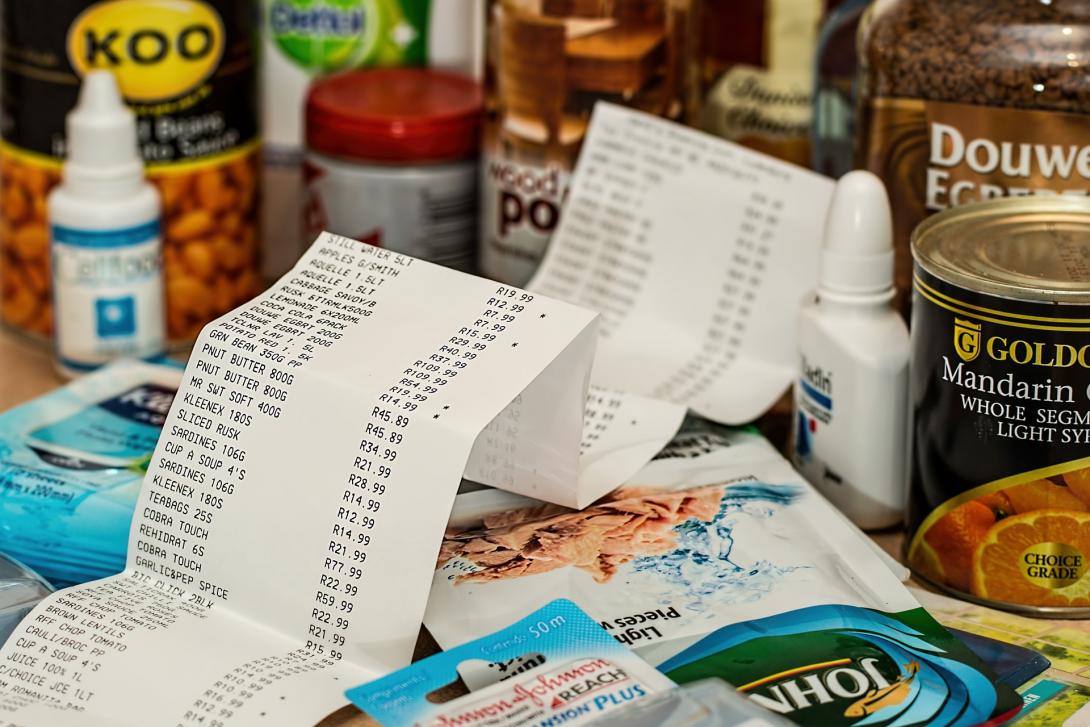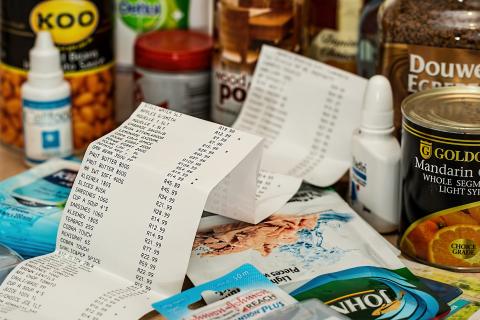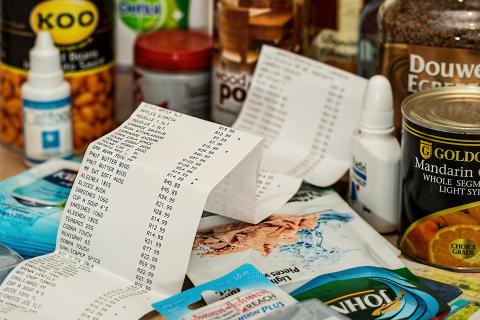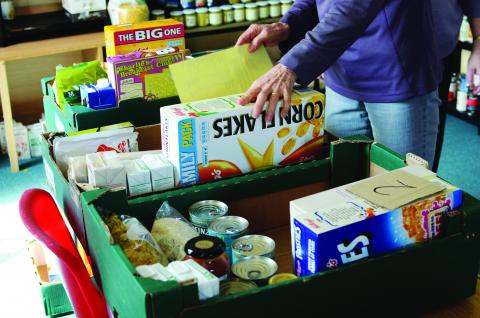23 March 2022
Food Prices Tracking: March Update

by Shona Goudie and Indu Gurung
Devastating headlines on the Ukraine-Russia war have filled the news in recent weeks. Although the implications for other countries in comparison are very much smaller, the war will have consequences globally particularly from the impact on food and fuel. Globally and in the UK, food and fuel prices have already been rising at a worrying rate over the past few months and now the invasion of Ukraine will escalate the pre-existing crisis to much greater levels. Drastic action will be required imminently to ensure that people both in the UK and around the world do not go hungry in 2022. In this blog we explore these recent developments on food prices and the cost of living.
Food prices have continued to rise sharply in the UK and Globally
Overall Inflation in the UK
The Consumer Price Index (CPI) rose by 6.2% in the 12 months to February 2022, up from 5.5% in January 20221 - a 30 year high2. The ONS stated the sharp rise has been driven by a range of categories such as food, energy and household goods.
Economists’ predictions of the magnitude of inflation are continually being revised particularly now due to the uncertainty caused by the war but are all in agreement that the cost of living is going to increase drastically. The Bank of England’s most recent estimation is that inflation will hit 8% in April, and could hit double digits at the end of year if Russia’s invasion continues to elevate the global energy prices3.
UK Food Prices
The CPI data charting take-home retail prices for commonly purchased food and drink items shows that prices have risen 5.1% in the 12 months to February 2022. Prices have risen across all the food categories monitored in February 2022 compared to a year before, with the highest increase of 6.7% in oils and fats and then fruits at 6.2%. Before the war, the Bank of England were already predicting that food price inflation will increase over the coming months4.
Global Food Prices
The FAO’s Food Price Index shows a new all-time high in global food prices for key commodities in February 2022- 20.7% above its level a year ago and up by 3.9% from January. The rise was driven by a record high in vegetable oil, which was up by 8.5% since January. Dairy, cereals and meat price sub-indices were also up, whereas sugar prices have dropped for the third consecutive month5. Russia’s invasion of Ukraine began in the last week of February, so is not fully captured in these figures.
The invasion of Ukraine will have a significant impact on food security
Global Impact
Global food prices have steadily risen since mid-20206 primarily due to climate-related disruption to harvests and due to pandemic-related disruptions to labour and fuel impacting all the way along food supply chains.
Food prices will be driven higher still by the invasion of Ukraine, having drastic implications for food security in many countries both due to availability and affordability of food. Russia and Ukraine combined contribute 12% of total calories traded globally, 72% of global sunflower oil and 34% of the global wheat market - key staples for many countries7. Therefore, the disruption to production and trade that is already being seen threatens global food security.
The most immediate effects are resulting from decreased exports due to blocked ports on the Black Sea (which will particularly impact on wheat supply in large parts of Africa and the Middle East8). Planting of crops that would usually take place in Spring is also disrupted as the most productive areas of land are under attack, farmers are fighting in the war, there is a fuel shortage, and tractors are being used to tow equipment instead of farm the land9,10 . Depending on how long the war continues harvests later in the year will also be impacted11.
This disruption to the global food supply will push up prices of food. In fact, global prices of wheat already skyrocketed as a result with some reports of increases of over 50% following the invasion12. Furthermore, the war is driving up input costs - most significantly fuel, fertiliser and animal feed – which in turn will be major drivers of food price increases. Fuel prices had already been on a sharp upward trajectory due to shortages as we emerged from the pandemic, and prices of natural gas in Europe spiked nearly 70% following the invasion13. As natural gas is a key input to produce nitrogen fertiliser, soaring gas prices effects fertiliser supply and prices. Russia is the largest exporter of nitrogen fertilisers14 and produces significant quantities of potash and phosphate which are also key fertiliser ingredients15.
UK Impact
The UK will be less impacted than many other countries which are highly reliant on Ukraine and Russia for food imports, but the influence on global food and input prices will have substantial knock-on impact here, and to an extent will mirror the global picture: food, fuel, fertiliser and animal feed prices have all been rising and will most likely continue to do so. Defra have claimed that there will be no direct impact on UK food supply as we import little food from Eastern Europe16, but this does not reflect indirect impact on food prices. Wheat is less of a concern in the UK as we produce large quantities, but we are likely to see shortages of sunflower oils, with concerns that sufficient quantities of alternatives won’t be available and the cost of these will be driven up substantially17.
Similarly, only 5% of gas imports into the UK last year came directly from Russia18, but global markets will drive up prices in the UK. In fact, the NFU have warned of possible vegetable shortages due to gas shortages19, and the British pig farmers have warned the industry could collapse due to animal feed cost rises20. Last week George Eustice assured the House of Commons that they are looking into the cost of inputs particularly for the livestock sector, and are working with industry to address the challenge of fertiliser production21. (In the UK, fertiliser prices have already risen 200% in the past year according to the NFU22).
UK farmers also have concerns regarding the impact on labour given that men aged 18 to 60 have been barred from leaving the Ukraine and since we left the EU, 60% of seasonal work visas to pick and pack have been taken by Ukrainians23. The NFU reports that farmers are keen to house refugees under the new Government scheme to mitigate these concerns24.
The cost of living crisis in the UK continues to escalate further threatening household food security
Even before the war broke out, the cost-of-living crisis was having an awful impact on the lives of people in the UK due to food and fuel prices as well as overall inflation rising at a speed that income and benefit levels have not kept pace with, forcing people to cut back on heating and eating.
An ONS survey reported 81% of adults have seen their cost of living rise. Food was the most reported cost rise (92%), followed by gas and electricity (80%)25. 37% reported cutting down on energy at home to save money, and 22% were having to rely on using up savings. Furthermore, work is not protecting people from these struggles: the Living Wage Foundation found that one in five workers have had to take out a pay-day loan to cover the cost of essentials in the past year26. This puts people at increased risk for going into debt and making them less able to cope with upcoming price shocks. The situation is worse for those on benefits with 40% going into debt in order to be able to eat or pay bills according to the Trussell Trust27.
We know that people cut down on the amount they spend on food when money is tight. In keeping with this, Kantar data suggests that people are switching away from branded products to cheaper “own-label” products28.
Predictions are that the cost of living crisis is going to get significantly worse, particularly in light of the Russia-Ukraine war impacting further on food and energy prices. The energy bill cap is expected to be raised to as high as £3000 in October (from £1971 in April)29 which will put further pressure on food budgets. IFS analysis estimates that the impact of the war on energy prices will mean the measures previously announced (that were already insufficient), will only cover a fifth of the increase in prices30 in energy making the struggle of heating and eating even worse.
The Resolution Foundation estimate that typical household income will fall by about £1,000 once inflation is taken into account31. For those on benefits, the Joseph Rowntree Foundation estimate that on average they will be £500 per year (not accounting for inflation) worse off due to benefit levels not keeping rise with inflation32, on top of being £1040 worse off per year following the removal of the £20 uplift in October 2021.
Predictions of decreasing real incomes, and increasing fuel and food prices are at their worst yet. Families being unable to afford to eat well or heat their homes will have a devastating effect on their health, both physically from having to rely on less nutritious food and mentally from the stress of not being able to provide for their families. Government cannot stop a global crisis, but they must do more to mitigate the impact on its citizens in the UK. Even if the war stops tomorrow, the impact on food and fuel prices will not be reversed immediately and the disruption that has already occurred will having an ongoing effect. Government will have to take much stronger actions if it is to prevent us moving from a cost of living crisis into a cost of living emergency.
For more information on food prices, see our Food Price Tracker.
The next update will be published on 13th April.

Shona joined The Food Foundation as a Project Officer in 2019 and has worked on research, policy and advocacy across a range of projects over that time including leading our food insecurity surveys and flagship annual Broken Plate reports. She now works across the charity's policy portfolio including our children's food campaigns, food insecurity and food environments. She is a Registered Associate Nutritionist with a background in clinical nutrition who worked in dietetic departments in NHS hospitals before joining The Food Foundation.

Indu joined The Food Foundation in 2019 as part of the Rank Foundation’s Time to Shine scheme, moving into a Project Officer role in 2020. She works on the Peas Please and Plating up Progress projects. Prior to joining The Food Foundation, Indu completed a MSc in Public Health and a BSc in Human Nutrition. She is interested in reducing health inequalities, children’s health and wellbeing, and sustainable and nutritious food system/diets. Indu is also a lover of veg, having recently taken up urban gardening.
References
- https://www.ons.gov.uk/economy/inflationandpriceindices/bulletins/consu…
- https://www.ft.com/content/6982f7d7-0c8f-434f-b370-7644a0bb4b5e
- https://www.ft.com/content/6982f7d7-0c8f-434f-b370-7644a0bb4b5e
- https://researchbriefings.files.parliament.uk/documents/CBP-9428/CBP-94…
- https://www.fao.org/worldfoodsituation/foodpricesindex/en/
- https://www.theguardian.com/world/2022/mar/14/ukraine-invasion-worldwid…&
- https://www.ifpri.org/blog/how-will-russias-invasion-ukraine-affect-glo…;
- https://www.bbc.co.uk/news/uk-scotland-60644376;
- https://www.farminguk.com/news/ukrainian-farm-leader-shares-struggles-w…
- https://www.ft.com/content/02095093-329b-4b66-9f80-13d07350014c?desktop…
- https://www.ifpri.org/news-release/ukraine-invasion-threatens-global-wh…
- https://www.ft.com/content/54a1c522-7141-4794-8b5c-1b5fdd47d968?desktop…
- https://www.theguardian.com/business/2022/feb/25/ukraine-russia-inflati…
- https://www.fao.org/3/cb9013en/cb9013en.pdf
- https://www.bbc.co.uk/news/business-60623941
- https://deframedia.blog.gov.uk/2022/03/11/environment-secretary-attends…
- https://www.ft.com/content/d266b6d1-746b-4116-ab92-95b19cec98bc?desktop…
- https://www.theguardian.com/business/2022/feb/25/ukraine-russia-inflati…
- https://www.express.co.uk/news/uk/1579401/food-prices-uk-russia-war
- https://www.bbc.co.uk/news/uk-england-humber-60707839
- https://www.bbc.co.uk/news/uk-england-humber-60707839
- https://www.thegrocer.co.uk/commodities/how-is-russias-invasion-of-ukra…
- https://www.theguardian.com/environment/2022/mar/11/uk-farmers-call-for…
- https://www.farminguk.com/news/ukrainian-farm-leader-shares-struggles-w…
- https://www.ft.com/content/269bcf8d-7ee1-4050-9947-12fbb321ff03
- https://www.independent.co.uk/business/low-paid-falling-behind-on-bills…
- https://www.trusselltrust.org/2022/03/17/two-in-five-brits-receiving-un…
- https://www.theguardian.com/business/2022/mar/01/grocery-prices-uk-rise…
- https://www.theguardian.com/money/2022/mar/12/uk-energy-bills-martin-le…
- https://www.theguardian.com/business/2022/mar/10/rishi-sunak-under-grow…
- https://www.resolutionfoundation.org/publications/the-living-standards-…
- https://www.jrf.org.uk/press/400000-people-could-be-pulled-poverty-real…






